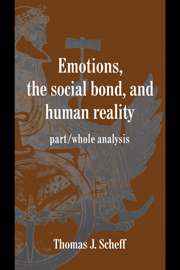Theory and method
Published online by Cambridge University Press: 22 October 2009
Summary
There is a marvelous passage in one of Kundera's (1995) essays on the history of the novel which exactly evokes the problem I attack here, how to access human reality:
Try to reconstruct a dialogue from your own life, the dialogue of a quarrel or a dialogue of love. The most precious, the most important situations are utterly gone. Their abstract sense remains (I took this point of view, he took that one. I was aggressive, he was defensive), perhaps a detail or two. But the acousticovisual concreteness of the situation in all its continuity is lost.
And not only is it lost but we do not even wonder at this loss. We are resigned to losing the concreteness of the present. We immediately transform the present moment into its abstraction. We need only recount an episode we experienced a few hours ago: the dialogue contracts to a brief summary, the setting to a few general features. This applies to even the strongest memories which affect the mind deeply like a trauma: we are so dazzled by their potency that we don't realize how schematic and meager their content is.
When we study, discuss, analyze a reality, we analyze it as it appears in our mind, in our memory. We know reality only in the past tense. We do not know it as it is in the present in the moment when it's happening, when it is. The present moment is unlike the memory of it. Remembering is not the negative of forgetting. Remembering is a form of forgetting.
- Type
- Chapter
- Information
- Emotions, the Social Bond, and Human RealityPart/Whole Analysis, pp. 15 - 18Publisher: Cambridge University PressPrint publication year: 1997

